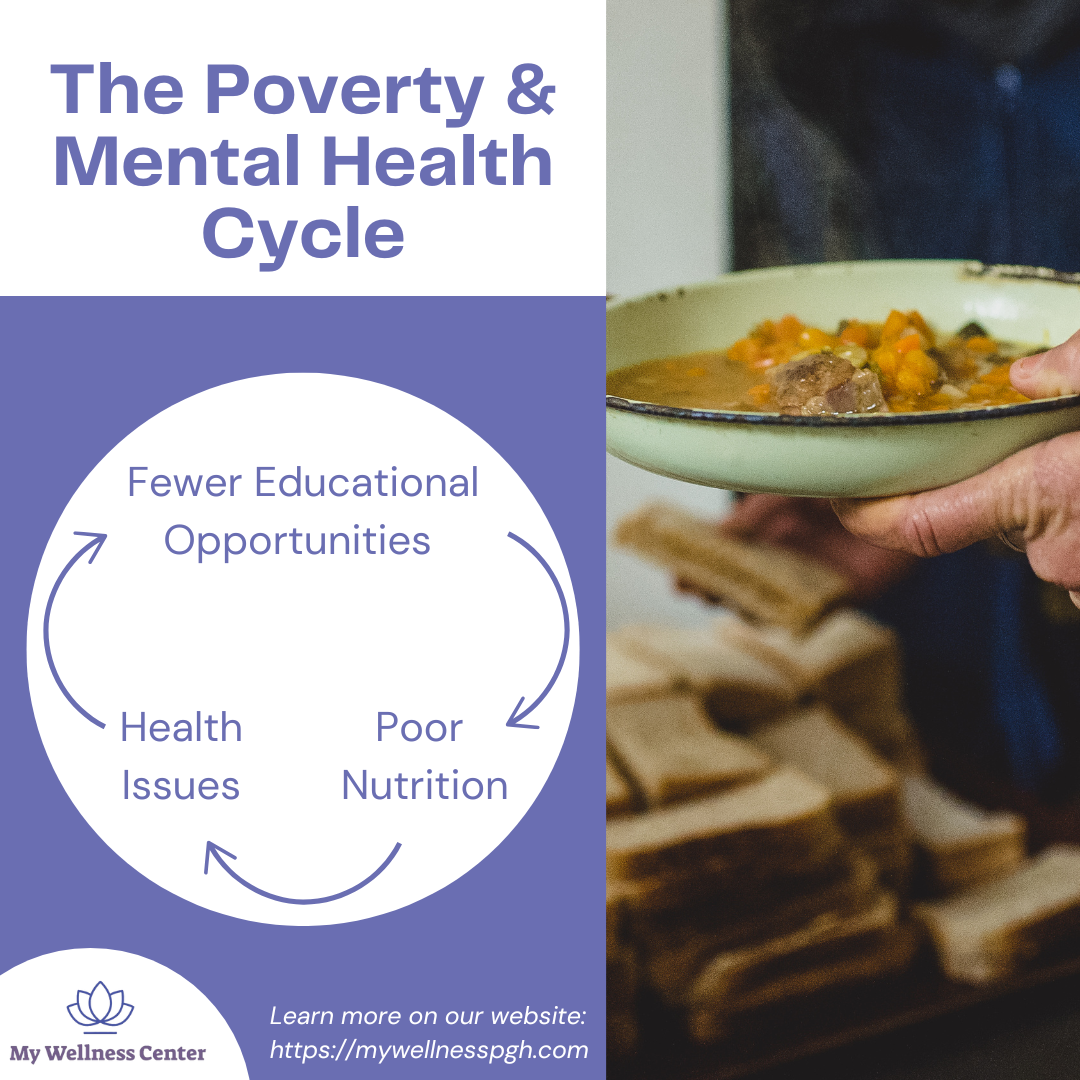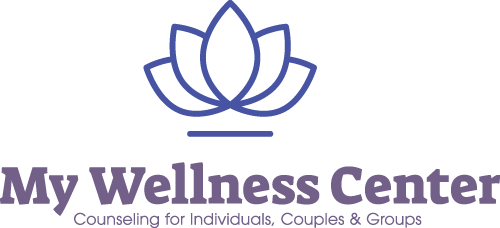Poverty and mental health go hand-in-hand. Together, they create a vicious downward spiral that feels impossible to escape.
But there’s hope.
Through a combination of personalized therapy, access to public resources, and a clear vision for the future, you can break free from the chains of poverty and mental health issues to live a better life!
A perfect example: We work with a former sex worker who relied on sex to afford rent. Through therapy, he helped her tackle the mental health issues that had plagued her for years, and we also helped her find resources for gainful employment and to help her become a homeowner.
Recently, she made this remark in a therapy session: “Honestly, the biggest problem in my life right now is my car needs an oil change.”
Talk about a major change!
Pull yourself out of the challenges of poverty. Read our full article to learn more:
Table of Contents
Understanding the Vicious Cycle of Poverty and Mental Health
How to Break the Cycle of Poverty and Mental Health
Find A Pittsburgh Therapist
Understanding the Vicious Cycle of Poverty and Mental Health
To break the cycle of poverty and mental health, we need to first understand why they’re so connected.
Here are three big reasons these two challenges often appear together:

1. Poverty Leads to Fewer Educational Opportunities And Less Education Support
In most towns throughout the US, public schools are funded through local property taxes. But poor neighborhoods have higher unemployment rates and lower property values, leading to less tax revenue—and lower overall investment in schools.
And these schools often don’t get as much support from the state. In fact, the U.S. Department of Education has found 40% of high-poverty schools don’t get a fair share of state and local funds.
Students growing up in poverty also have fewer educational resources, including afterschool programs, homework help, or study guidance. At home, they may not have a computer or internet access, which may cause them to fall behind in their studies. And if their parents work multiple jobs, they could be unavailable to provide homework support or general encouragement.
2. Poverty Leads to Poor Nutrition
Poverty contributes to poor nutrition, and poor nutrition directly impacts mood, mental health, and physical wellbeing.
Consider this: 95% of serotonin is produced in your stomach. If you’re not eating properly, you may not get enough natural serotonin, which is critical to mental health. Believe it or not, the Mediterranean diet (which emphasizes fruits, vegetables, whole grains, legumes, nuts, and seafood) and traditional Japanese diet (which emphasizes fish and plant-based foods) have both been shown to lower the risk of depression by 25-35%
Malnutrition has been shown to negatively impact productivity, mood, and earning potential—all of which can lead to costly health issues that can contribute to even greater poverty. Poor nutrition also lowers IQ. Students who suffered from early childhood malnutrition frequently demonstrate worse cognitive function, behavioral issues, and academic performance.
3. Poverty Leads to Physical and Mental Health Issues
Poverty doesn’t just make life harder—it makes people sicker. Individuals living in poverty are more likely to suffer from chronic health conditions, such as asthma, diabetes, heart disease, and obesity. They’re also more likely to experience high levels of stress, anxiety, and depression.
Why? Because poverty brings constant challenges that weigh heavily on both the body and the mind. Financial stress, food insecurity, substandard housing, limited access to clean air and water, and a lack of affordable healthcare all contribute to poor physical health. When you’re constantly worried about how to pay your bills or put food on the table, your body remains in a heightened state of stress—and over time, this can lead to serious health issues, including weakened immune function and increased inflammation.
Mental health is hit just as hard. Living in or near poverty increases the risk of mental illnesses like depression, PTSD, and substance use disorders. And unfortunately, because many people in poverty don’t have access to mental health care—or simply don’t have time or transportation to seek help—these issues often go unaddressed, leading to long-term emotional damage and an even steeper uphill climb.
Poor physical and mental health can make it even harder to hold down a job, raise a family, or pursue education. In other words, poor health doesn’t just result from poverty—it also perpetuates it, locking individuals and families into a cycle that feels impossible to break.
How to Break the Cycle of Poverty and Mental Health
Breaking cycles is always challenging (take a look at our blog on parenting and PTSD for another example), but it’s possible. Here’s how to break away from poverty and mental health challenges at the same time:
1. Go to Therapy
There are many reasons to ignore therapy altogether when you’re dealing with therapy:
- I can’t find a ride.
- I can’t afford internet for telehealth.
- I can’t afford therapy.
Everything can be overcome. Many of our patients rely on Medicaid to pay for therapy, and we can help our patients understand bus schedules and access other public resources to get to therapy.
More importantly, therapy has two major benefits:
1. Therapy can help you overcome mental health challenges. Whether you’re suffering from PTSD, childhood trauma, substance abuse, or similar issues, we can help.
Through proven therapy practices, we’ll help you cut to the core of your problems so you can understand the root of your mental health challenges—and then we’ll help you develop strategies for managing these issues every single day.
In time, you’ll move beyond your most painful struggles and find ways to live life unburdened by your greatest pains.
2. Therapy can help you access critical resources. For our clients dealing with poverty, we spend extra time focusing on public resources that can support them and their families.
In our article on unemployment and depression, we focused on a variety of powerful local resources, including:
- Pennsylvania Women Work, which helps men and women find their next job opportunity.
- Breaking the Chains of Poverty, which helps individuals develop new life skills while learning valuable trades.
- PA CareerLink, which helps people identify their own unique skills and find ideal job openings.
But we can also help our patients identify:
- Local food pantries that can help overcome malnutrition and food insecurity.
- Local transportation resources, like PA Ways to Work.
- Local financial resources for housing, like OwnPGH—which helps individuals access up to $90,000 to become homeowners.
Through individualized therapy and public resources, you can escape the cycle of poverty with greater financial resources and a clearer, healthier mind.
2. Find Hope
One of the biggest challenges that perpetuates poverty from day to day and generation to generation is the absence of hope and the belief that things can get better. Once you’ve spent years and years inside poverty, it’s difficult to imagine life changing for the better.
But there’s hope.
You can become a homeowner. You can find an excellent, well-paying job. You can live in a nice neighborhood.
You can escape poverty.
And you can definitely escape the negative thoughts, experiences, and memories that fill your mind.
Through therapy, we can explore opportunities for a better future, but it starts with you. You need to maintain hope that things can get better. Envision the life you want to live, and allow that vision to inspire you to keep moving forward.
3. Build Community and Support Networks
Poverty is isolating. When you’re struggling to make ends meet, it’s easy to feel like you’re completely alone—but isolation only makes mental health struggles worse. One of the most powerful ways to break the cycle of poverty and mental illness is by building a strong support system.
That might mean reconnecting with family, leaning on friends, or engaging with your community in new ways. It might also mean joining a support group or attending group therapy sessions—where you’ll realize you’re not the only one going through these challenges.
This is especially important if you’re a single parent, dealing with substance abuse, or managing PTSD. You’re not alone; others are experiencing the exact same challenges.
Connection breeds resilience. When you’re surrounded by people who understand your experience and want to help you succeed, it becomes easier to face daily challenges, access important resources, and take steps toward a better life. These relationships offer encouragement, accountability, and even practical help—from childcare to carpooling to job leads.
Therapy can help you identify and strengthen the relationships that matter most. And if you don’t have a support network right now, we can help you build one—from local nonprofit organizations to community centers to peer support groups.
You don’t have to do it all alone. With the right people around you, everything becomes more possible—and more hopeful.
Find A Pittsburgh Therapist
Ready to break the cycle? Connect with one of our compassionate Pittsburgh therapists who can help you overcome the unique roadblocks standing in your way. Contact us to get started!

